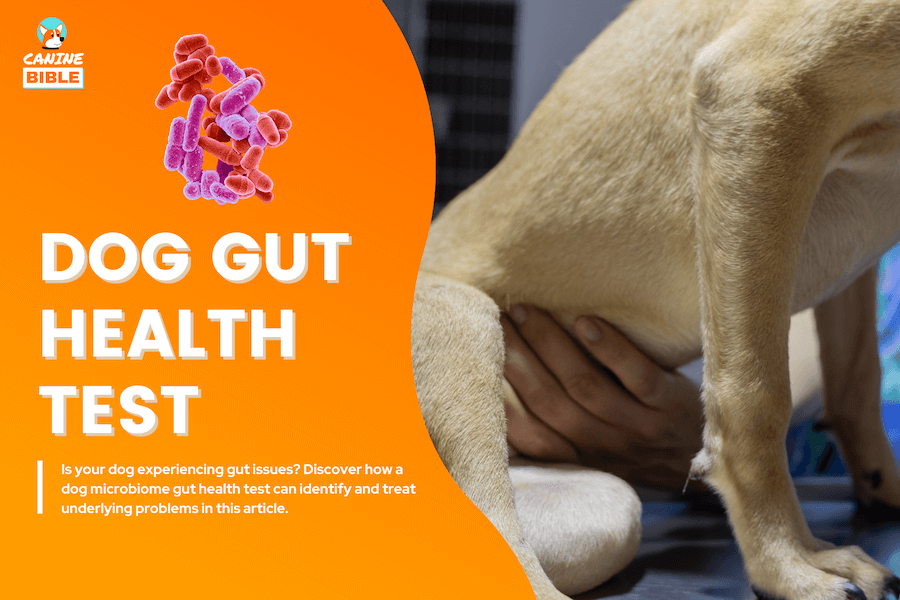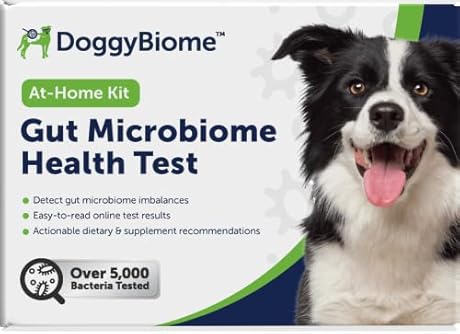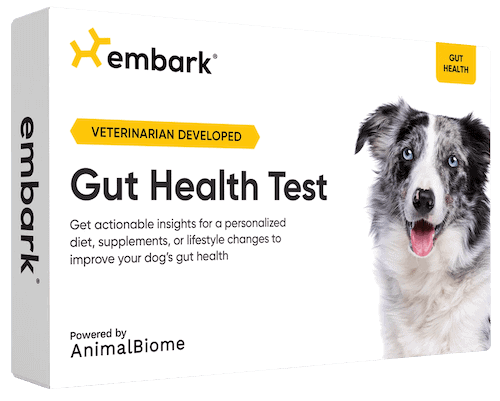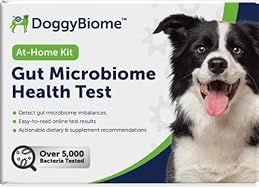Dog Microbiome Gut Health Test: How They Work, Best Kits & Benefits

Canine Bible is reader-supported. We receive affiliate commissions via some of our links. This doesn’t affect rankings. Learn more.
Did you know the gut microbiome plays a crucial role in a dog’s overall health, and an imbalance in the gut microbiome can lead to various health problems in dogs, such as digestive issues, allergies, and even behavioral problems?
Fortunately, advances in veterinary medicine have made it possible to test a dog’s gut microbiome health using a dog microbiome gut health test. While some veterinarians may offer these tests, at-home testing kits are also available for dog owners. However, with the variety of testing kits available, it can be challenging to determine which ones are worth investing in and whether the results provide helpful, accurate information about a dog’s health.
This article will explore the benefits of testing your dog’s gut health and every question in between. We also share the best dog microbiome gut health test kits available. Let’s dive right in!
Best Dog Gut Health Test — At A Glance
Scroll to the right to see all our recommendations for the best microbiome dog gut health tests.
Click this link to go straight to the reviews. However, we encourage you to keep reading to make a more educated decision before picking a dog gut health test.
What Is A Dog Gut Microbiome?
A gut microbiome refers to the microbes in your dog’s digestive system. The dog’s stomach, intestines, colon, and esophagus are all important parts of its GI tract and contain microbes that affect the digestion process. These microbes can be good or bad bacteria, fungi, viruses, and other microorganisms that help digest food, produce essential nutrients, and maintain the immune system. Collectively, these microscopic organisms are referred to as gut microbiota or flora.
When dogs have an imbalance of gut microbes, various health effects may occur. Common symptoms of gut disruptions may include bloating, stool changes, heartburn, and other health problems.
The Impact of Gut Microbiome Imbalance On Dogs
Impacts of a gut microbiome imbalance can have some health effects on our pets.
What Is Dog Gut Microbiome Testing?
The dog microbiome gut health test is a non-invasive test that analyzes the bacteria and other microorganisms in a dog’s gut. The test measures various parameters such as the microbiome’s diversity, specific bacteria’s presence, and pathogenic bacteria’s presence. A gut health test detects bacterial imbalances and provides actionable insights for personalized diet, supplement, or lifestyle changes to improve your dog’s health. This could lead to a better quality of life and increased overall health for their dog.
How Do Dog Microbiome Tests Work?
The dog microbiome gut health test analyzes a sample of your dog’s stool. The sample is sent to a laboratory and analyzed using next-generation DNA sequencing technology. This technology provides a detailed analysis of the microbiome present in the sample. The test measures various parameters, such as the microbiome’s diversity, specific bacteria’s presence, and pathogenic bacteria’s presence.
What Can You Learn From Testing Your Dog’s Gut?
Here are some benefits and what you can learn from testing your dog’s microbiome.
For example, an imbalance in the gut microbiome can lead to digestive issues such as diarrhea, vomiting, and constipation. By identifying an imbalance in the gut microbiome early, you can take steps to correct the issue before it becomes more serious.
Why Test Your Dog’s Microbiome? The Research
Here are the main research-backed reasons supporting testing your dog’s biome and its importance.
At-Home Dog Gut Health Test vs. Vet’s Office Tests
At-home dog microbiome testing is relatively easy to administer and provides quick results. They are convenient and cheaper as the results can be obtained without visiting a veterinarian’s office. However, an at-home gut dog test should not be used to self-diagnose potential health problems. After your test, you should bring your results to your next vet’s appointment and discuss further steps to take regarding your dog’s health.
Vet’s office tests can be more expensive and time-consuming than at-home tests. Additionally, some dogs may find the experience of visiting a veterinary clinic stressful, which can affect the accuracy of the test results. The main advantage of vet’s office tests is that they provide a more comprehensive assessment of a dog’s health and may include a physical examination, blood work, and other diagnostic tests.
You should choose which test to do depending on your needs. It’s important to note that the test your vet uses, is usually the same as an at-home test. The only difference is the brand test they use.
Best At Home Dog Gut Health Tests Kits
Here are the top recommendation for the best dog gut microbiome test kits.
Best Overall — Embark Vet Gut Health Test Review
Why We Picked & Recommended It
Embark Vet is a reputable company known for their comprehensive dog DNA tests. However, they also offer a gut health test. Embark Vet gut health test wins our top pick because they use DNA sequencing to analyze the bacteria in the sample and compare it to our healthy dog reference set to determine if an imbalance is present. Embark Vet is powered by AnimalBiome, the world’s largest cat and dog microbiome sample database. They have gathered and examined over 30,000 fecal samples from domestic cats and dogs. From this pool of samples, they have compiled a set of samples that set their standards for healthy pets.
What Sets It Apart From Competitors
By using AnimalBiome’s database, they were able to build a profile of the specific bacterial taxa (groups) they could expect to find in the gut microbiome of a healthy dog. They identified a “healthy reference set” consisting of 17 taxa that make up the core microbiome of dogs.
Key Features
What We Like & Don’t Like
Pros
Cons
Best For Consultation — DoggyBiome Gut Health Test Reviews

Why We Picked & Recommended It
What we loved about this DoggyBiome Gut Health Test is the free 15-minute phone consultation with one of their gut microbiome test experts to review your dog’s personalized gut health report. This test kit includes everything you need to collect a stool sample from your dog and send it back to us for assessment.
What Sets It Apart From Competitors
DoggyBiome compares your dog’s results with its healthy reference set, revealing whether it lacks essential bacterial groups. If so, that absence may result from antibiotic use, diet, illness, or other factors.
Key Features
What We Like & Don’t Like
Pros
Cons
How Much Does Dog Microbiome Testing Cost?
The cost of dog microbiome testing can vary depending on several factors, such as the type of test, the laboratory conducting the analysis, and the location. Generally, at-home dog microbiome testing kits cost anywhere from $35 to $100, depending on the brand and the features included in the kit.
On the other hand, veterinary clinics may offer more comprehensive testing that includes a physical exam, blood work, other diagnostic tests, and gut microbiome testing. These tests can cost several hundred dollars or more, depending on the specific tests performed and the clinic’s location.
Alternatives To At-Home Microbiome Tests
At-home dog microbiome tests are a convenient way to assess the health of a dog’s gut microbiome. However, alternative ways to monitor the health of a dog’s gut may be more suitable for some pet owners.
Dog Gut Microbiome Health Test — Conclusion
Testing your dog’s gut health is a simple yet effective way to assess its overall health and well-being. Identifying potential health issues early can prevent more severe health problems from developing. If you are considering using a dog microbiome gut health test, it is essential to consult with a veterinarian to determine which test is best for your dog. Additionally, it is necessary to follow the instructions the test kit manufacturer provides carefully. Finally, always work with your veterinarian to interpret the test results and create a plan for improving your dog’s gut health. Pet insurance might cover the cost of this kit.
Like It? Subscribe & Share!
Canine Bible authorship represents the unified voice of our entire editorial team and our in-house veterinarians rather than a single author. Each article, blog post, and review published under the Canine Bible name undergoes a rigorous review process, involving all team members to guarantee accuracy and up-to-date in accordance with the latest veterinarian research. This collaborative effort is an integral part of our editorial process and aligns with our four pillars of content creation. This approach ensures our content is backed by expert knowledge and factual information, offering our readers reliable, actionable, and trustworthy content.









